 |
 |
Performance reporting model
: Diagram
OUTPUT GROUP 1: Broadcast and Transcription
Services
1.1 Broadcast Production
> 1.2 Transcription
OUTPUT GROUP 2:
Support and Technology Services
2.1 Infrastructure
OUTPUT 1.2 TRANSCRIPTION
Hansard produces electronic and hard copy transcripts of the proceedings of the Senate, the House of Representatives, the Main Committee of the House of Representatives, parliamentary committees and parliamentary conferences.
At the output group level, Hansard measures performance against transcription quantity, price and quality.
Transcription quantity
Transcripts of parliamentary proceedings are provided to occupants of Parliament House in hard copy and available electronically through ParlInfo, the parliamentary database. These are also provided to the community through:
- the Internet via fully searchable Hansard transcripts on ParlInfo Web
- libraries and educational institutions, and
- direct subscriptions.
Performance indicator: Number of hours transcribed, by category.
Basis for comparison: Trends over time.
Chambers
Chambers Hours Transcribed
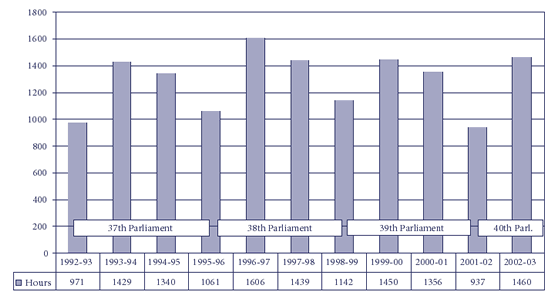
1460 hours of chamber proceedings were transcribed in 2002-2003, an increase of 56 per cent over 2001-2002 (937 hours). The increase is in line with the total hours transcribed in previous nonelection years, particularly the comparable year of the last Parliament, 1999-2000 (1450 hours).
200203 Hours Transcribed - Chambers
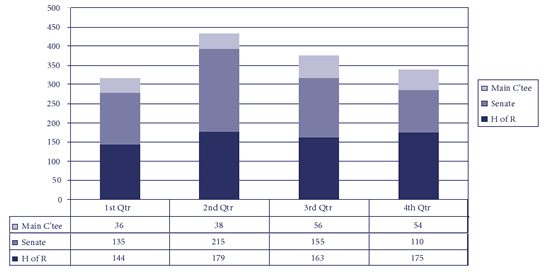
The Main Committee of the House of Representatives continued to meet for extended periods during sittings of the House. Sittings of the Main Committee increased by 45 per cent during the period 1999-2000 and 2002-2003 which resulted in pressure on staff workload and rostering to meet timeliness standards.
Additional staff were recruited during the year to further implement new work arrangements which, together with the continued targeted use of external providers, allowed committee and chamber delivery standards to be met on almost all occasions.
Committees
Committees Hours Transcribed
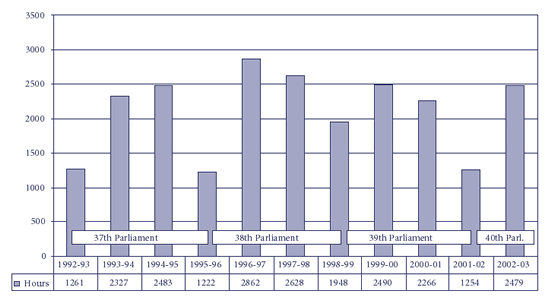
2479 hours of committee hearings were transcribed in 2002-2003, a 98 per cent increase over 2001-2002 (1254 hours). As with chambers, these results are in line with the total hours transcribed in previous non-election years, particularly the comparable year of the last Parliament, 1999-2000 (2490 hours).
200203 Hours Transcribed - Committees
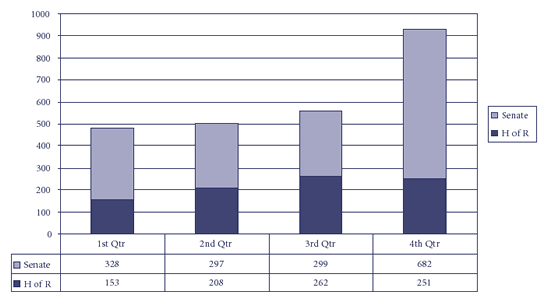
Senate Estimates committee hearings during the May-June period provided significant workload challenges for Hansard. During this period, the workload was more than double that in previous quarters which presented substantial staffing difficulties.
The department continued to use external transcript providers to manage peak workloads. Hansard's in-house capacity, which transcribes around 90 per cent of total material, continued to be maintained through recruitment and training of new editors.
Senate committee hearings made up 65 per cent of the total committee workload, with House of Representatives committee hearings the remainder. Joint committee hearings are included in the total hours for the administering chamber. Interstate committee hearings accounted for around 40 per cent of total hours transcribed, consistent with recent years.
Transcription price (cost)
Performance indicator: Direct and full cost per hour of transcript, by category.
Basis for comparison: Trends over time.
The overall cost of the Transcription output was $13.659 million in 2002-2003, an increase of 9 per cent on 2001-2002 ($12.522 million).
Price (Cost) Per Hour of Transcript - Chambers and Committees
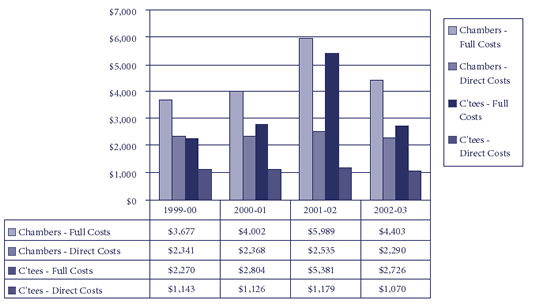
The average full cost per hour of chamber transcript for 2002-2003 was $4,403.While a significant decrease when compared with 2001-2002 ($5,989), the figure reflects a slow yet steady rise in full costs per hour over recent years. The high 2001-2002 result was due to largely fixed infrastructure and staffing costs being averaged against low activity hours caused by the 2001 election.
Despite this long-term increase in the average full cost per hour over time, the direct cost per hour of chamber transcript in 2002-2003 has remained relatively steady at $2,290 compared with $2,535 in 2001-2002. The direct cost per hour for the comparable year in the previous parliament (1999-2000) was $2,341.
The average full cost per hour of committee transcript was $2,726 in 2002-2003 - a significant decrease when compared with the 2001-2002 results of $5,381.While the majority of this decrease can be attributed to the significant increase in committee hearings following the 2001 election, operational cost savings are also evident when comparing the non-election year results.
As was the case with chambers, the direct cost per hour for transcripts has remained very steady over time and decreased from $1,179 in 2001-2002 to $1,070 in 2002-2003. This result is the most favourable to be recorded in recent years, particularly when compared with a similar year of activity from the previous Parliament (1999-2000) at $1,143 per hour.
Transcription quality
Transcription quality Client satisfaction
Performance indicator: Number of clients very satisfied or satisfied with services.
Basis for comparison: Trends over time.
The DPRS 2003 Client Survey sought the views of Senators, Members and senior parliamentary staff regarding their levels of satisfaction with DPRS services. Of those surveyed, 90 per cent were either very satisfied or satisfied with transcription services overall, an increase of 11 per cent on the DPRS 2000 Client Survey results.
Transcription Client Satisfaction Levels - Very Satisfied or Satisfied
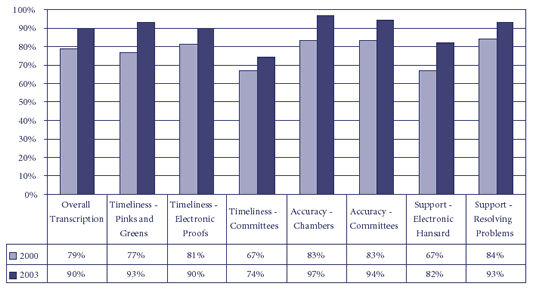
Very positive results were recorded in the levels of client satisfaction across all areas of transcription services. The particularly significant areas of positive movement between the 2000 and 2003 surveys were the timeliness of speech pinks and greens (up by 16 per cent), the accuracy of chamber transcripts (up by 14 per cent) and the user friendliness of the electronic Hansard (up by 15 per cent).
While improving 7 per cent since the 2000 survey, client levels of satisfaction with the timeliness of committee transcripts remains an area requiring continuing management of client expectations and continuing internal emphasis on the importance to clients of timely transcripts.
Transcription quality - Accuracy
Performance indicator: Accurate transcription error rate per 100 pages transcribed, as notified by client, by category.
Basis for comparison: Trends over time.
Hansard records error rates based on the number of corrections to pinks and greens returned by Senators and Members and accepted as Hansard errors, and the number of corrections to committee transcripts returned by committee secretaries and accepted as Hansard errors. The trends over time demonstrate that, despite a much greater emphasis on timeliness for both chamber and committee work, staff have been able to maintain very high professional standards.
Transcription Error Rates - Chambers and Committees (Errors Per 100 Pages)
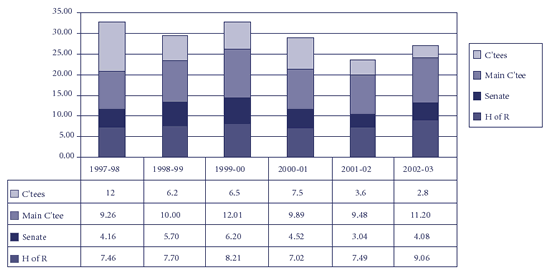
Very high levels of transcription accuracy were maintained throughout this year.
While the combined chamber error rate of 7.13 errors per 100 pages is an increase on the 2001-2002 result of 5.73 errors per 100 pages, 2001-2002 was an election year with significantly less transcription volume.When compared against the rate achieved in the comparable year of the last parliamentary cycle, 1999-2000 (7.53 errors per 100 pages), the 2002-2003 result reflects a marginal improvement in accuracy.
The committee transcripts error rate of 2.8 errors per 100 pages reflects the best ever accuracy result in recent years.
Transcription quality - Timeliness
Performance indicator: Number of transcripts delivered within standard, by category.
Basis for comparison: Trends over time.
Transcription Timeliness - Chambers and Committees (Transcripts Delivered Within Standard
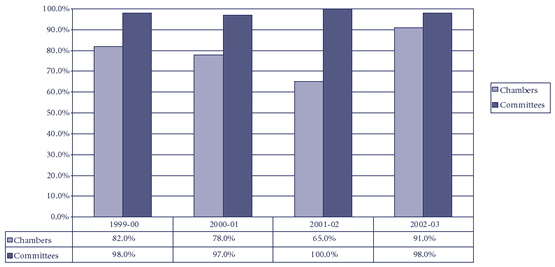
The timeliness standards required for chamber transcripts are:
- individual draft speeches ('pinks' and 'greens') available within 2 hours
of speech finishing;
- electronic proof Hansard reports available within three hours of house rising;
- hard copy proof Hansard reports available in Parliament House by 8.30am on
the day following the sitting day;
- electronic Official Hansard available within 10 working days following last
sitting day in the week; and
- hard copy Official Hansard delivered to publisher within 10 working days following last sitting day in the week.
Despite these high standards, and increasing client demands for earlier transcript deliveries, overall chamber transcript timeliness standards were met on 91 per cent of occasions. This is a rise of 26 per cent over 2001-2002 and a rise of 9 per cent over the comparable year of high activity in the previous Parliament (1999-2000).
For committees, the very high rate of timeliness for transcript deliveries was generally maintained in 2002-2003 although the result of 98 per cent timeliness was 2 per cent lower than the previous year. The new staffing arrangements, together with the cost effective use of external providers, enabled this high rate to be maintained in peak workload periods. The comparable rates for 2001- 2002, 2000-2001 and 1999-2000 were 100 per cent, 97 per cent and 98 per cent respectively.
Committees Transcripts by Priority
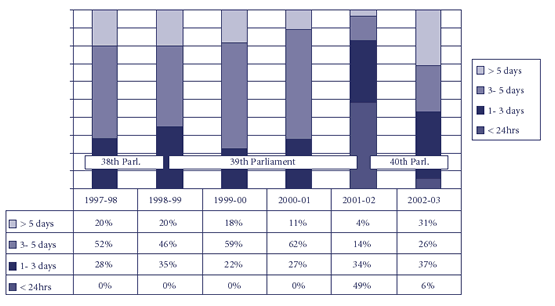
The high rate of timeliness for committee transcript deliveries has also been achieved despite an increasing demand for faster turnaround times. This has been particularly evident in the number of requests for delivery within 24 hours or within three days which - discounting the two election years of 1998-1999 and 2001-2002 where the proportions are applied to a significantly lower volume - have increased by 21 per cent between the comparable year in the last cycle (1999-2000), and (2002-2003).
Community access
Performance indicator: Community access to parliamentary proceedings - number of Internet and ParlInfo access requests.
Basis for comparison: Trends over time.
The department makes parliamentary proceedings, including Hansard transcripts and live television coverage, available on the Internet either through webcasting or through access to ParlInfo, the parliamentary database.
Community Access to Parliamentary Proceedings (Internet Hits via www.aph.gov.au and Web Interface to ParlInfo Hits via WIPI)
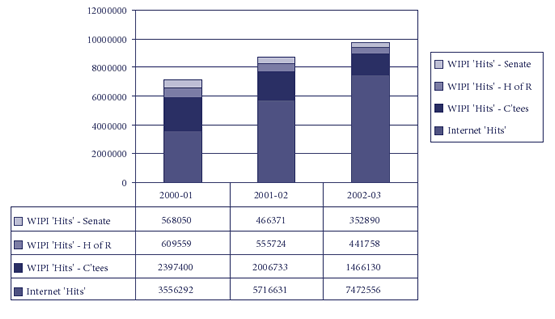
The trend of significant increases in recorded hits to print ready Hansard transcripts on the Internet continued in 2002-2003, rising a further 31 per cent to 7,472,556 from 5,716,631 in 2001-2002.
However, the decrease in access of the fully searchable Hansard transcripts using ParlInfo Web continued, with a 25 per cent fall from 3,028,828 in 2001-2002 to 2,260,778 in 2002-2003. Access requests relating to committee transcripts accounted for 65 per cent of total requests, with the remainder being for chamber transcripts.